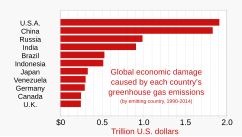
Back انبعاثات الغازات الدفيئة من الصين Arabic Emisiones de gases de efecto invernadero de China Spanish انتشار گازهای گلخانه ای توسط چین Persian 中國溫室氣體排放 Chinese
China's total greenhouse gas emissions are the world's highest, accounting for 35% of the world's total according to the International Energy Agency. The country's per capita greenhouse gas emissions are the 34th highest of any country, as of 2023.
When measuring production-based emissions, China emitted over 12.6 gigatonnes (Gt) CO2eq of greenhouse gases in 2023, 35% of the world total.[3][4][5] When measuring in consumption-based terms, which adds emissions associated with imported goods and extracts those associated with exported goods, China accounted for 13 gigatonnes (Gt) or 25% of global emissions in 2019.[6]
Greenhouse gas emissions stem mainly from coal burning, including coal power, coal mining,[7] and blast furnaces producing iron and steel.[8] 79% of CO2 emissions are from the burning of coal.[9] According to the Carbon Majors Database, Chinese state coal production alone accounts for 14% of historical global emissions.[10] In 2024, China's total historical greenhouse gas emissions surpassed those of the European Union (EU), but trail those of the United States.[11]
As of 2019[update], the country's greenhouse gas emissions exceeded the combined emissions of the developed world.[6][4][12] China's per capita emissions correspond to over 10.1 tonnes CO2eq emitted per person each year, over the world average and the EU average but lower than the second largest emitter of greenhouse gases, the United States, with its 17.6 tonnes per person, according to a 2021 analysis by the Rhodium Group.[6][needs update] Analysis by Our World in Data also puts China's per capita emissions at over the world and EU averages but less than averages in Australia, Canada, and the U.S.[13] Accounting for historic emissions, OECD countries produced four times more CO2 in cumulative emissions than China, due to developed countries' early start in industrialization.[4][6] Overall, China is a net exporter of greenhouse emissions.[14]
The targets laid out in China's nationally determined contribution at the Paris Agreement in 2016 will likely be met, but are not enough to combat global warming.[15][needs update] China has committed to peak emissions by 2030 and net zero by 2060.[16] China continues to build coal-fired power stations in 2020 and promised to "phase down" coal use from 2026.[17] According to various analysis, China is estimated to overachieve its renewable energy capacity and emission reduction goals early, but long-term plans are still required to combat the global climate change and meeting the Nationally Determined Contribution (NDC) targets.[18][19][20]
- ^ ● Source for carbon emissions data: "Territorial (MtCO₂) / Emissions / Carbon emissions / Chart View". Global Carbon Atlas. 2024.
● Source for country population data: "Population 2022" (PDF). World Bank. 2024. Archived (PDF) from the original on 22 October 2024. - ^ Chart based on: Milman, Oliver (12 July 2022). "Nearly $2tn of damage inflicted on other countries by US emissions". The Guardian. Archived from the original on 12 July 2022. Guardian cites Callahan, Christopher W.; Mankin, Justin S. (12 July 2022). "National attribution of historical climate damages". Climatic Change. 172 (40): 40. Bibcode:2022ClCh..172...40C. doi:10.1007/s10584-022-03387-y. S2CID 250430339.
- ^ Cite error: The named reference
:1was invoked but never defined (see the help page). - ^ a b c "China's Emissions Now Exceed All the Developed World's Combined". Bloomberg News. 6 May 2021. Archived from the original on 2021-11-01. Retrieved 2021-11-01.
- ^ "CO2 Emissions: China - 2020". Climate TRACE. Archived from the original on 2021-11-12. Retrieved 2021-09-27.
- ^ a b c d Larsen, Kate; Pitt, Hannah (6 May 2021). "China's Greenhouse Gas Emissions Exceeded the Developed World for the First Time in 2019". Rhodium Group. Archived from the original on 17 June 2021. Retrieved 1 November 2021.
- ^ Cite error: The named reference
:0was invoked but never defined (see the help page). - ^ "Analysis: China's carbon emissions grow at fastest rate for more than a decade". Carbon Brief. 2021-05-20. Archived from the original on 2021-07-27. Retrieved 2021-07-07.
- ^ "China - Countries & Regions". IEA. Retrieved 2024-09-10.
- ^ Cite error: The named reference
:5was invoked but never defined (see the help page). - ^ Plumer, Brad; Rojanasakul, Mira (2024-11-19). "How China's Rising Emissions Could Change Global Climate Politics". The New York Times. ISSN 0362-4331. Retrieved 2024-11-19.
- ^ "Report: China emissions exceed all developed nations combined". BBC News. 2021-05-07. Archived from the original on 2021-05-25. Retrieved 2021-05-07.
- ^ Ritchie, Hannah; Roser, Max; Rosado, Pablo (2020-05-11). "CO₂ and Greenhouse Gas Emissions". Our World in Data. Archived from the original on 2024-08-16. Retrieved 2024-09-09.
- ^ Ritchie, Hannah (7 October 2019). "How do CO2 emissions compare when we adjust for trade?". Our World in Data. Archived from the original on 12 June 2023. Retrieved 18 July 2023.
- ^ "To prevent catastrophic global warming, China must hang tough". The Economist. 2019-09-19. ISSN 0013-0613. Archived from the original on 2019-10-04. Retrieved 2019-10-04.
- ^ "China aims to cut its net carbon-dioxide emissions to zero by 2060". The Economist. ISSN 0013-0613. Archived from the original on 2021-07-29. Retrieved 2020-09-29.
- ^ "Why China's climate policy matters to us all". BBC News. 2021-08-08. Archived from the original on 2022-03-12. Retrieved 2021-10-03.
- ^ "China on Track to Blow Past Xi's Clean Power Goal Five Years Early". Bloomberg News. 28 June 2023. Archived from the original on 2023-07-04. Retrieved 2023-07-18.
- ^ "China's CO2 emissions fall but policies still not aligned with long-term goals". Reuters. 21 November 2022. Archived from the original on 2023-10-11. Retrieved 2023-07-18.
- ^ "China Climate Action". Climate Action Tracker. Archived from the original on 2021-05-15. Retrieved 2023-07-18.

